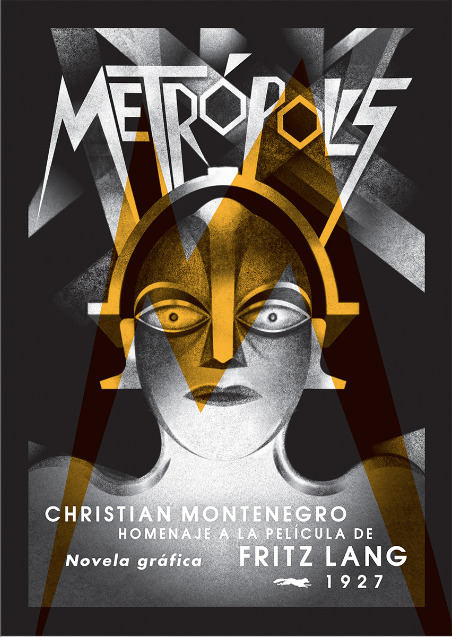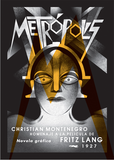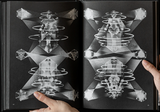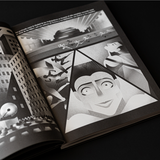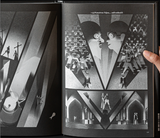Metrópolis / Graphic Novel Spanisch / Christian Montenegro
Für Jugendliche und Erwachsene
"Christian Montenegro presents in Metropolis one of his most visually powerful works to date: a true tribute to the mythical film by Fritz Lang, one of the most important in the history of cinema and the first feature film to be considered a Memory of the World by UNESCO.
In this dystopia, which reaches bookstores in the form of a graphic novel, the Argentine artist reissues the clash of the two worlds in the city of Metropolis: on the one hand, that of the wealthy elite who run from luminous skyscrapers and, on the other another, that of the workers who exhaust their forces during endless days at the service of the machines.
The hard lines and the digital technique, together with the chromatic contrasts, recreate the mechanical essence and the lines of that urban labyrinth and its explosive transformation into a battlefield of light and shadow, shapes and movements. Montenegro reproduces the graphic patterns of each scene and manages to capture in his drawings that continuous and geometric dance, characteristic of the film.
This edition, which adds a new title to our classic film series inaugurated by Potemkin, also includes an epilogue by Fernando Martín Peña, director of the film section of the Museum of Latin American Art in Buenos Aires, where in 2008 he recovered a copy of the movie in extended version. The historian and archivist gives an account of this remarkable exhumation while he goes through the historical details of this infinite fable."
-------------------------------------------------
Christian Montenegro presenta en Metrópolis uno de sus trabajos de mayor fuerza visual hasta la fecha: un auténtico homenaje al mítico film de Fritz Lang, uno de los más importantes de la historia del cine y el primer largometraje considerado Memoria del Mundo por la UNESCO.
En esta distopía, que llega a las librerías en forma de novela gráfica, el artista argentino reedita el choque de los dos mundos de la ciudad de Metrópolis: por un lado, el de la élite de ricos que dirige desde luminosos rascacielos y, por el otro, el de los trabajadores que extenúan sus fuerzas durante jornadas interminables al servicio de las máquinas.
Las líneas duras y la técnica digital, junto con los contrastes cromáticos, recrean la esencia maquinal y los trazos de ese laberinto urbano y su explosiva transformación en un campo de batalla de luces y sombras, formas y movimientos. Montenegro reproduce los patrones gráficos de cada escena y consigue capturar en sus dibujos esa danza continua y geométrica, característica de la película.
La presente edición, que añade un nuevo título a nuestra serie de cine clásico inaugurada por Potemkin, también incluye un epílogo de Fernando Martín Peña, director de la sección de cine del Museo de Arte Latinoamericano de Buenos Aires, donde recuperó en 2008 una copia de la película en versión extendida. El historiador y archivista da cuenta de esta notable exhumación al tiempo que recorre los detalles históricos de esta fábula infinita.
© Libros del Zorro Rojo
| Titel | Metrópolis / Graphic Novel Spanisch / Christian Montenegro |
| Kurator | mundo azul |
| Typ | Graphic Novel Spanisch |
| Online seit | Jun 23, 2023 |
Für Jugendliche und Erwachsene
"Christian Montenegro presents in Metropolis one of his most visually powerful works to date: a true tribute to the mythical film by Fritz Lang, one of the most important in the history of cinema and the first feature film to be considered a Memory of the World by UNESCO.
In this dystopia, which reaches bookstores in the form of a graphic novel, the Argentine artist reissues the clash of the two worlds in the city of Metropolis: on the one hand, that of the wealthy elite who run from luminous skyscrapers and, on the other another, that of the workers who exhaust their forces during endless days at the service of the machines.
The hard lines and the digital technique, together with the chromatic contrasts, recreate the mechanical essence and the lines of that urban labyrinth and its explosive transformation into a battlefield of light and shadow, shapes and movements. Montenegro reproduces the graphic patterns of each scene and manages to capture in his drawings that continuous and geometric dance, characteristic of the film.
This edition, which adds a new title to our classic film series inaugurated by Potemkin, also includes an epilogue by Fernando Martín Peña, director of the film section of the Museum of Latin American Art in Buenos Aires, where in 2008 he recovered a copy of the movie in extended version. The historian and archivist gives an account of this remarkable exhumation while he goes through the historical details of this infinite fable."
-------------------------------------------------
Christian Montenegro presenta en Metrópolis uno de sus trabajos de mayor fuerza visual hasta la fecha: un auténtico homenaje al mítico film de Fritz Lang, uno de los más importantes de la historia del cine y el primer largometraje considerado Memoria del Mundo por la UNESCO.
En esta distopía, que llega a las librerías en forma de novela gráfica, el artista argentino reedita el choque de los dos mundos de la ciudad de Metrópolis: por un lado, el de la élite de ricos que dirige desde luminosos rascacielos y, por el otro, el de los trabajadores que extenúan sus fuerzas durante jornadas interminables al servicio de las máquinas.
Las líneas duras y la técnica digital, junto con los contrastes cromáticos, recrean la esencia maquinal y los trazos de ese laberinto urbano y su explosiva transformación en un campo de batalla de luces y sombras, formas y movimientos. Montenegro reproduce los patrones gráficos de cada escena y consigue capturar en sus dibujos esa danza continua y geométrica, característica de la película.
La presente edición, que añade un nuevo título a nuestra serie de cine clásico inaugurada por Potemkin, también incluye un epílogo de Fernando Martín Peña, director de la sección de cine del Museo de Arte Latinoamericano de Buenos Aires, donde recuperó en 2008 una copia de la película en versión extendida. El historiador y archivista da cuenta de esta notable exhumación al tiempo que recorre los detalles históricos de esta fábula infinita.
© Libros del Zorro Rojo






